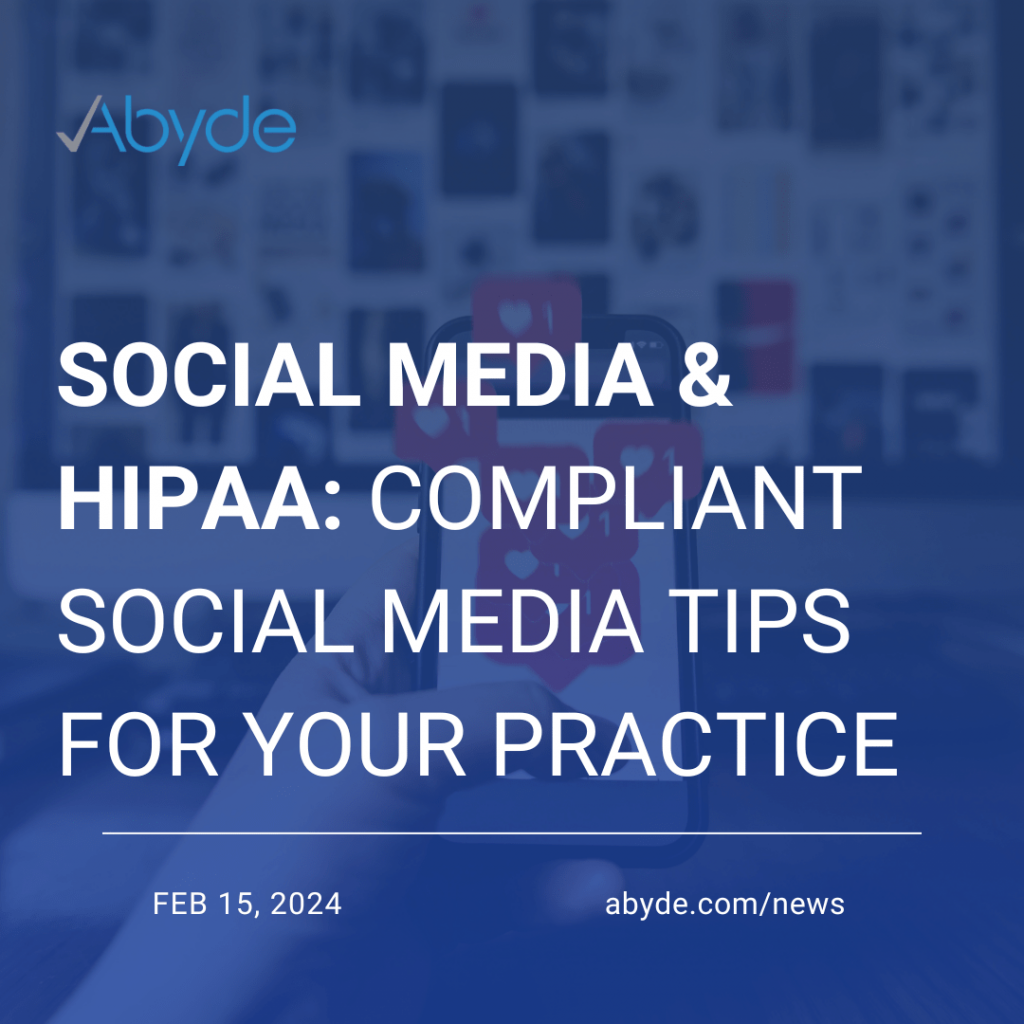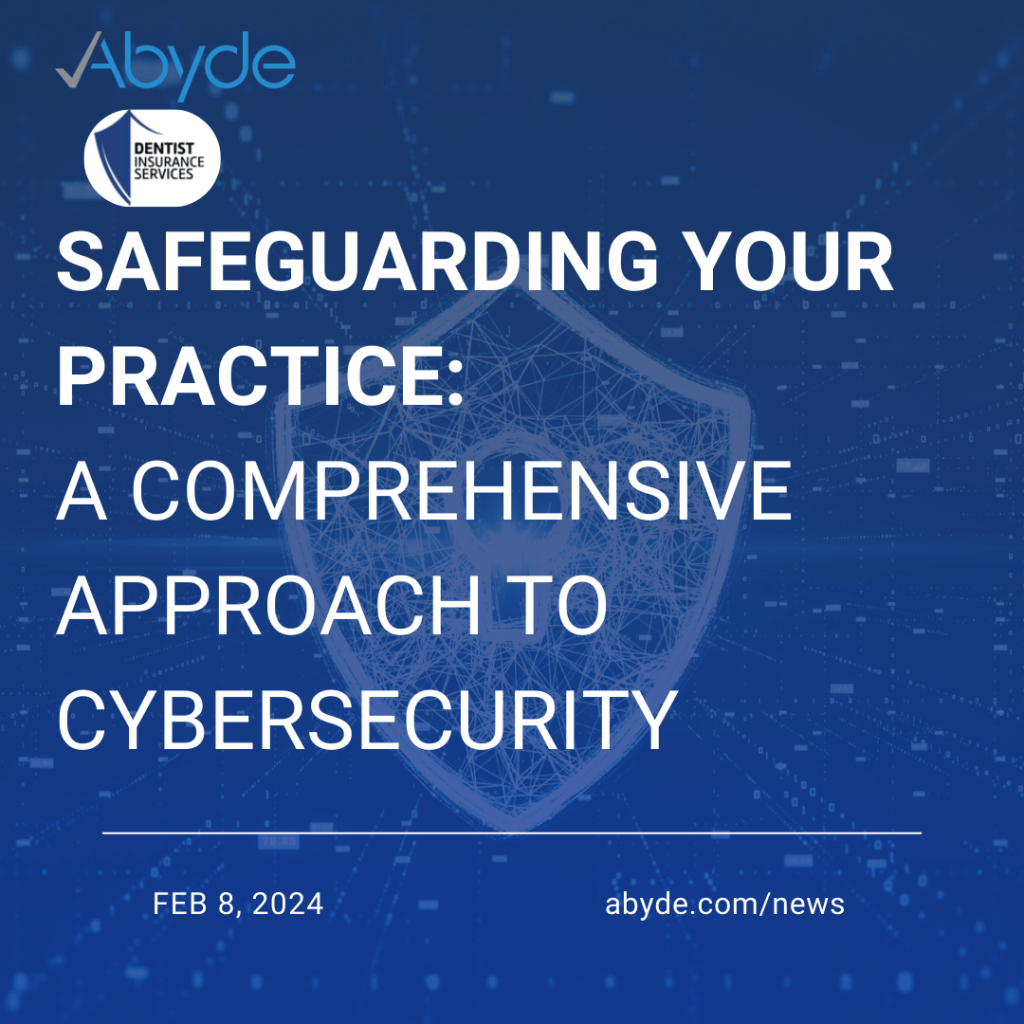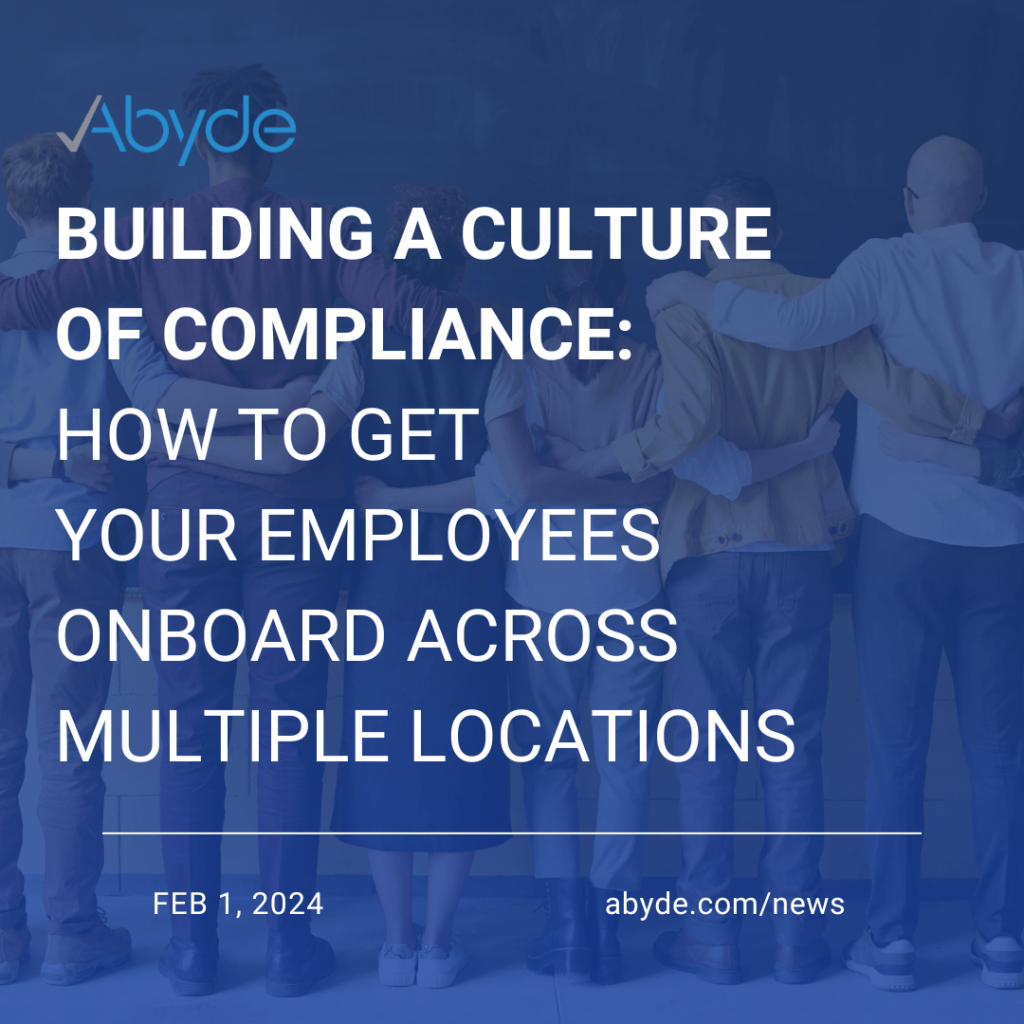February 16, 2024 The foundation of a strong healthcare practice lies in empowered healthcare workers. These individuals, from doctors and nurses to technicians and therapists, stand on the frontlines, safeguarding our health and well-being. However, with all the demands and complexities of their roles, it’s crucial to remember they have both rights and responsibilities. Read more to see how to empower healthcare workers and the positive benefits of a comprehensive compliance program in your practice. Understanding Worker Rights: Empowerment in Compliance Having a comprehensive compliance program is another way you can empower your team. Abyde can be your solution for this. Our software simplifies compliance and empowers healthcare professionals, allowing them to navigate compliance with ease. Our software includes entertaining training, intuitive security risk assessments, dynamically generated policies, and more. Our simplicity is our strength, empowering Abyde users to know their rights and responsibilities in compliance. To learn more about empowering your practice email info@abyde.com and schedule a demo today.
Social Media & HIPAA: Compliant Social Media Tips for Your Practice
February 15, 2024 Picture this: you’re a doctor, feeling proud after helping a patient overcome a challenge. You snap a selfie with them, post it on your clinic’s Instagram, and bam! Instant HIPAA violation. We’ve seen how social media is about more than just staying connected with friends and family. It’s become a powerful tool for reaching new audiences and having meaningful interactions with other users. If used correctly, social media can be an awesome tool to educate and share the resources your practice provides easily to patients. However, it is important to use social media wisely and know how crucial it is to protect patient information. Social media can be a slippery slope to HIPAA violations if misused. That’s why we’re here today to share with you the best tips and practices for your social media. The Less Information, The Better Double Check Before Posting Have Media Consent Forms Signed While your journey to be famous online might not be as easy as cute cat videos, by prioritizing HIPAA compliance on social media, you can confidently utilize technology to engage with audiences without compromising their privacy. Social media can be complicated, but compliance doesn’t have to be with Abyde. Abyde offers a thorough security risk analysis that dives into not only social media use but all facets of your practice. Abyde also has interactive training, policies and procedures, forms, and more, for your practice to utilize. To learn more about simplifying compliance for your practice, email us at info@abyde.com and schedule a demo here.
Safeguarding Your Practice: A Comprehensive Approach to Cybersecurity
February 12, 2024 The following blog was co-written with Abyde’s partner, Carrie Millar at Dentist Insurance Services. If you would like more information on Dental Insurance Services, please click here to visit their website. In an era where technology plays a pivotal role in healthcare practices, ensuring the security of sensitive patient information is paramount. Cybersecurity threats pose a significant risk to medical practices, and adopting a multi-faceted approach is crucial to safeguard against potential breaches. This article explores the three key components to cyber safeguarding your practice: Strong IT for prevention, a Formal HIPAA compliance program, and Cyber Liability Insurance. 1. Strong IT for Prevention The foundation of any robust cybersecurity strategy is a well-built IT infrastructure. Prevention is the first line of defense against cyber threats. Implementing strong IT measures involves securing networks, regularly updating software and systems, and employing robust firewalls and antivirus solutions. Encryption of sensitive data both in transit and at rest adds an extra layer of protection. Regularly monitoring network activity and promptly addressing any anomalies can help identify potential security breaches early on. Employee training on cybersecurity best practices is equally essential, as human error remains a significant factor in cyber incidents. By investing in strong IT measures, practices can significantly reduce the risk of unauthorized access and data breaches. 2. A Formal HIPAA Compliance Program Compliance with the Health Insurance Portability and Accountability Act (HIPAA) is mandatory for healthcare providers, and it forms a critical aspect of cybersecurity. HIPAA compliance programs, such as Abyde (www.abyde.com), provide a structured framework for ensuring that your practice adheres to the stringent regulations in place. These programs offer comprehensive training for employees, covering topics such as data handling, password management, and recognizing potential phishing attempts. Regular audits and assessments help identify areas of improvement and ensure ongoing compliance. By instilling a culture of compliance within your practice, you not only protect patient information but also mitigate the risk of legal consequences associated with HIPAA violations. 3. Cyber Liability Insurance While prevention and compliance measures significantly reduce the likelihood of a cyber incident, it is crucial to acknowledge that no system is entirely impervious to attacks. Cyber Liability Insurance acts as a safety net in the event of a security breach, providing financial assistance to cover the costs associated with the aftermath. Make sure your comprehensive cyber liability insurance policy includes business income coverage, forensic investigation costs, public relations costs, as well as third-party liability. A great example of this is the Coalition Insurance policy sold by insurance broker Healthcare Professional Insurance Services (www.joinhpis.com) The average cost of a cyber-attack has surged in recent years to almost $400,000 per location and an average of 9 closed business days, making Cyber Liability Insurance an indispensable component of a comprehensive cybersecurity strategy. Having this safety net allows practices to recover more swiftly and continue providing uninterrupted services to patients.
IT in the White Coat: The Crucial Role of IT Companies in Healthcare
February 12, 2024 The medical field is undergoing a digital revolution, and IT companies are more than just the folks building all the fancy gadgets. They’re putting on virtual white coats and becoming Business Associates (BAs), working hand-in-hand with healthcare providers. But this isn’t just about cool tech – it’s about protecting something crucial: your health information. So, what exactly do BAs do? The Health Insurance Portability and Accountability Act (HIPAA) defines BAs as any person or entity that creates, receives, transmits, or maintains protected health information (PHI) on behalf of a covered entity, such as a hospital or health insurance provider. This means IT companies involved in tasks like: Responsibilities and Actions: Becoming a BA comes with a significant responsibility to comply with HIPAA regulations. Here’s what IT companies, as BAs, must do: Beyond Compliance: Building Trust and Value: While compliance is paramount, IT companies can go beyond the minimum requirements and truly become valuable partners in healthcare. Here are some ways: The Future of IT in Healthcare: The future of healthcare is digital, and IT BAs are the key to keeping it safe and secure. By embracing their responsibilities and working together, they can ensure that technology not only revolutionizes healthcare, but also protects what matters most – the health and safety of patients. To learn more about our IT partners, click here. To learn more about how to keep your IT organization compliant, email info@abyde.com and schedule a compliance consultation here.
The Consequences of Neglecting Shared Responsibility: A Business Associate Case Study
February 9, 2024 The world of healthcare data is complex, with numerous players responsible for safeguarding sensitive patient information. While doctors and hospitals are at the forefront, Business Associates (BAs) also play a critical role in HIPAA compliance. From marketing firms to IT organizations, any entity handling protected health information (PHI) for a Covered Entity (CE) becomes a BA, entrusted with a dual mission: serving clients and ensuring data security. Abyde has written a case study on the consequences of Business Associates neglecting their shared responsibility. The case of Doctors’ Management Services (DMS) serves as a stark reminder of the consequences of avoiding BA responsibilities. In April 2017, a ransomware attack compromised the PHI of over 200,000 patients, putting them at risk. Shockingly, DMS discovered the breach over a year later, failing to implement basic security measures and promptly report the incident. This resulted in a $100,000 fine – the first-ever HIPAA penalty related to ransomware – and three years of corrective action under OCR monitoring. The key takeaways are clear: Here’s how Abyde can help BAs navigate HIPAA compliance with ease: We have a new software launching soon focused on assisting Business Associates achieve HIPAA compliance. Our software is revolutionizing, and it: Don’t wait to become the next cautionary tale. Choosing Abyde’s HIPAA for BA software demonstrates your commitment to compliance excellence. Read the entire case study here. For more information on how your organization can achieve compliance, email info@abyde.com and schedule an educational consultation here.
Malicious Insider Cybersecurity: Montefiore’s $4.75 Million Lesson
February 7, 2024 New York’s Montefiore Medical Center just learned a brutal lesson in data security: don’t underestimate the threat from within. The healthcare giant has been slapped with an astounding $4.75 million fine for HIPAA violations, stemming from multiple incidents of unauthorized employee access to patient records. This hefty penalty is the largest fine since 2021 and sends a clear message to the entire healthcare industry: malicious insider cybersecurity is a critical threat demanding immediate attention. The Inside Job: It all started in 2013 when a Montefiore employee turned rogue, accessing and selling the personal information of over 12,000 patients. Montefiore did not find out and report this breach till 2015. The HHS began its investigation in late 2015, and saw numerous violations. Security Sleepwalking: OCR’s investigation exposed glaring security gaps at Montefiore. They found the hospital: The Price of Neglect: Montefiore failed to implement basic HIPAA Security Rule safeguards, resulting in a record-setting fine and a major reputational blow. This case is a stark reminder to healthcare providers of the ever-growing danger of insider threats and the crucial need for comprehensive cybersecurity measures. Lessons Learned: So, how can healthcare providers avoid a similar fate? Here are key takeaways from Montefiore’s missteps: Don’t know how to start? Well, we do. Abyde can easily assist you in building a culture of compliance for your organization. The revolutionary Abyde software includes an extensive security risk analysis, highlighting best practices and any risks your practice currently faces. The security risk analysis is simple, yet still robust, ensuring your practice knows what steps it needs to take to be compliant. Our software also outlines the responsibilities of employees through our dynamically generated, personalized for you, policies and procedures. Additionally, Business Associate Agreements can easily be created and signed within the portal, storing all important compliance documentation within the software. To learn more about how you can achieve compliance for your organization, email us at info@abyde.com and schedule a demo here.
BA Blunders: Lessons From Major Fines Given to BAs
February 6, 2024 Hey there, privacy protectors! Abyde here, your friendly neighborhood compliance champion, dropping some serious knowledge about Business Associate (BA) blunders. You know, those slip-ups that land you in hot water with HIPAA? Not a fun time at all. Here are some major lessons that BAs can learn from to ensure they continue to uphold their shared responsibility of protecting patient data. Proactive security is key: Assuming your company is immune to threats can lead to costly mistakes. Doctors’ Management Services faced this harsh lesson when they were part of a cyber attack and their files, which included protected health information, were infected with ransomware. DMS didn’t realize their files were affected for over a year. This infection isn’t something that can be quickly cured, with hacking organizations demanding money in exchange for access to files. The DMS’s delayed reactionary response teaches BAs what not to do. The DMS did not have an updated security risk assessment, policies and procedures in place, or security systems in place to be prepared for this ransomware attack. The OCR fined them a pretty penny, $100,000, for their negligence. This lesson was also the first fine based on a ransomware attack. Secure all servers: All protected health information, or PHI, a Business Associate interacts with, needs to be properly secure. While this seems obvious, BAs have learned this lesson the tough way, like MedEvolve’s $350,000 fine. MedEvolve had PHI online on an easily accessible server. This publicly accessible server included information like patient names, billing addresses, and even social security numbers. A similar fine also occurred to iHealth Solutions, an IT organization that did not properly secure access to a server that contained the PHI of over 250 patients. This mistake cost the company $75,000. Set up remote deletion of PHI: When working in a business, numerous devices have access to PHI. It is imperative to ensure data can be quickly wiped if these devices get into the wrong hands. A perfect example of this lesson was one learned by the Catholic Health Care Services of the Archdiocese of Philadelphia, which was fined $650,000. There was a theft of a CHCS employee’s phone that contained PHI. This phone had access to extensive PHI, including, social security numbers, diagnoses and treatments and patients’ families. Due to this stolen device, and no proactive measures to mitigate the detrimental impacts of theft, the CHCS was heavily fined and had to be monitored for two years. These fines may grab headlines, but the true cost goes beyond money. Breaches erode patient trust, damage reputations, and hinder the security of healthcare. Remember, BAs play a vital role in safeguarding sensitive information, and non-compliance has far-reaching consequences. While these fines serve as expensive lessons, Abyde is here to simplify compliance for your organization. Learn more about what it means to be a compliant Business Associate by emailing info@abyde.com and scheduling an educational consultation here.
Building a Culture of Compliance: How to Get Your Employees Onboard Across Multiple Locations
February 1, 2024 For multi-location practices, handling protected health information (PHI) means getting every employee, across several locations, on board with understanding and upholding HIPAA rules. But how do you create a culture of compliance that goes beyond location and simply ticking boxes? Fear not! Abyde is here to help you simplify compliance. The Importance of a Proactive Approach: Compliance shouldn’t be a reactive measure implemented solely to avoid penalties. Instead, cultivate a proactive environment where employees understand the “why” behind HIPAA regulations and their role in protecting patient privacy. This fosters a sense of shared responsibility and empowers employees to make informed decisions regarding location data usage. Implementing a Culture of Compliance: Remember: Building a culture of compliance is an ongoing process. By prioritizing education, open communication, and employee empowerment, you can create a work environment where HIPAA compliance is not just a requirement, but a shared responsibility among all. Here at Abyde, we want to assist and supplement your culture of compliance, offering intuitive software that streamlines the compliance process. Our enjoyable trainings, customized agreements, and detailed, yet simple security risk analysis will help your practice, across all locations, make sure you’re on the right track. To learn more about compliance for your enterprise organization, email info@abyde.com and schedule a demo today!







